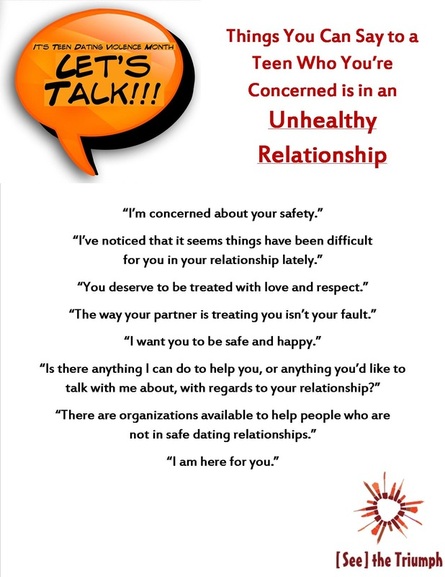|
By Christine Murray, See the Triumph Co-Founder
Throughout this month, we’re focusing on getting conversations started with teens about dating violence. For the most part, we’ve been focusing on conversations that are preventive, with the intention of starting a conversation and equipping teens with information and resources to support healthy dating relationships. But let’s say you have reason to believe that a teen you know may already be in an unhealthy or unsafe dating relationship. Maybe you’ve noticed one or more “red flags” of abuse, such as those described in the list provided by SafePlace in Austin, Texas. Perhaps you’ve actually witnessed some form of abuse, whether it was physical, sexual, or emotional. Or, you may just have a gut feeling that something isn’t right in this teen’s dating relationship. In any case, you are likely concerned for the teen’s safety and want to reach out to help them. It is very normal to struggle to know what to do and say when you’re concerned someone you know is potentially in an abusive relationship. You may find it helpful to look through some of the resources in our Collection on Resources for Supporting Survivors, especially the list of “5 Ways to Help Someone Who Is Being Abused by an Abusive Partner,” which you’ll also find in that collection. Talking with teens about this can be even more complicated, because they probably have more limited relationship experiences, and therefore they may not have a clear sense of what is normal and healthy in dating relationships. In addition, because teens are so heavily influenced by their peers, they may feel a need to stay with a dating partner due to peer pressure, and they may see unhealthy relationship behaviors among their peers and think that those things are normal. And, of course, teenagers can be very sensitive emotionally and be driven by their feelings of love and infatuation with their dating partners. When I’m training counselors and counseling students on working with victims and survivors of intimate partner violence, one of the main things I try to teach them is to be very careful about not conveying judgment about the victim/survivor and their choices. My clinical experiences have shown me that acting judgmentally is a surefire way to shut someone down and make it less likely they’ll be open to hearing what you have to say. So, when starting these conversations, be sure to do so sensitively and with an attitude of support and empathy for the teen’s situation. Here are some statements you can make to a teen to let him or her know that you’re concerned about their relationship:
Teens may not always be excited or responsive--at least right away--when others raise concerns about their dating relationships. However, it’s important for others to let them know that they have support available, and these conversations may help them to recognize unhealthy patterns in their relationships. Comments are closed.
|
Archives
July 2024
CategoriesAll About Intimate Partner Violence About Intimate Partner Violence Advocacy Ambassadors Children Churches College Campuses Cultural Issues Domestic Violence Awareness Month Financial Recovery How To Help A Friend Human Rights Human-rights Immigrants International Media Overcoming Past Abuse Overcoming-past-abuse Parenting Prevention Resources For Survivors Safe Relationships Following Abuse Schools Selfcare Self-care Sexual Assault Sexuality Social Justice Social-justice Stigma Supporting Survivors Survivor Quotes Survivor-quotes Survivor Stories Teen Dating Violence Trafficking Transformative-approaches |
Search by typing & pressing enter



 RSS Feed
RSS Feed